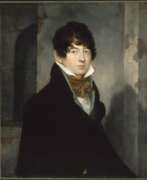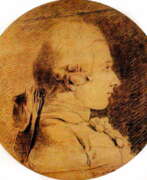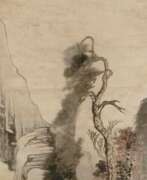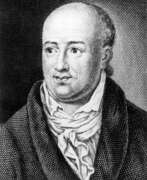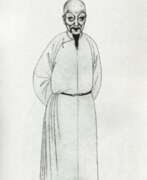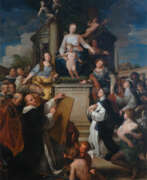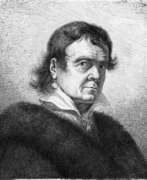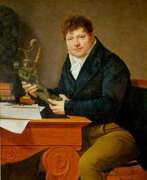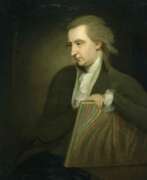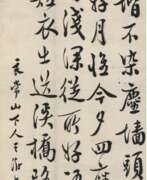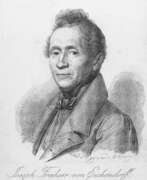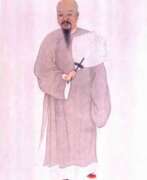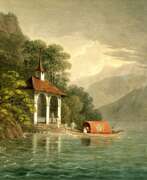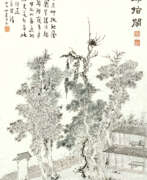Poets 18th century
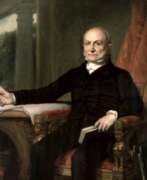

John Quincy Adams was an American politician and statesman, the sixth President of the United States (March 4, 1825 - March 4, 1829).
John Quincy Adams was the son of John Adams, the second President of the United States, and, of course, public service was his destiny. As a child, in 1778 he traveled to France with his father, who was then U.S. Commissioner to France. At the age of 14, Adams became personal secretary to Francis Dana, the U.S. Minister to Russia, serving as his father's secretary as well during the negotiation of the Treaty of Paris (1783). In 1787, the twenty-year-old Adams graduated from Harvard University and, after studying law, began practicing in Boston.
In addition to numerous diplomatic appointments, Quincy Adams served as a U.S. Senator from Massachusetts from 1803 to 1808. President James Madison appointed Adams U.S. minister to Russia in 1809, and Adams served until 1814. And under President James Monroe, he served as Secretary of State from 1817 to 1825 and is considered one of the best Secretaries of State in U.S. history.
John Quincy Adams won the 1824 presidential election in a four-way race against Henry Clay, William Crawford, and Andrew Jackson. As president, Adams supported a program to modernize the U.S. economy. But his popularity declined because of his approach to Native Americans, whom he supported against the demands of settlers from the west.
After losing the 1828 presidential election to Andrew Jackson, John Quincy Adams was elected to the House of Representatives, where he served as a representative from Massachusetts for the next 17 years. In the House of Representatives, Adams became one of the most vocal opponents of slavery. He consistently defended abolitionist views and policies, denouncing slavery as an immoral institution and attacking the interests of Southern slaveholders. During the U.S.-Mexican War of 1848, Adams was a leading opponent of the annexation of Texas, farsightedly predicting that it would lead to civil war.
After suffering two strokes, Adams died on February 23, 1848, at the age of 80. Had fate not predestined him to pursue politics, John Quincy Adams would have become a famous poet. He spent his life composing poems in various genres. After his death, many of his poems were collected and published in Poems on Religion and Society (1848).
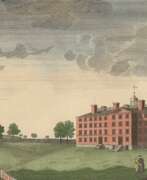

Paul Allen is an American editor, historian, and poet.
He attended Brown University and later moved to Philadelphia, where he was editor of The Port Folio, The Gazette of the United States, and The Federal Republican. Success came to Allen in Baltimore, where he served as editor until his death at the Baltimore Morning Chronicle newspaper. Paul Allen also joined the Delphic Club, and his epic poem Noah (1821) was a success.
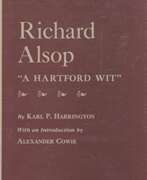

Richard Alsop was an 18th-century American writer and poet.
Alsop was one of the founders of the later famous literary group, the Hartford Witters. He wrote poetry in the journals The Political Greenhouse and The Echo, the latter soon becoming primarily concerned with satirical parodies of public speeches and articles of a political nature.
Alsop also published various translations from French and Italian.
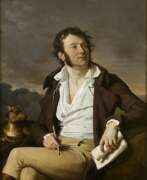

Antoine Vincent Arnault was a French playwright, fable poet and statesman.
Arnault was one of the most popular playwrights of the French Revolution and the First Empire and, like many writers of the time, he was also politically active. He carried out commissions for Napoleon Bonaparte and served him faithfully throughout his life.
Arnault wrote many plays and poems, among which his poem "Listok" about the fate of the emigrant was especially popular, it was repeatedly translated into different languages, including Russian.
His son was the playwright Lucien Arnault (1787-1863).
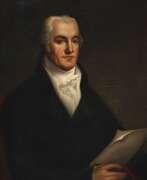

Joel Barlow was an American statesman, diplomat, French politician and poet.
A graduate of Yale University, he briefly served as a chaplain in the Revolutionary Army. In 1784, Barlow founded the American Mercury, a weekly newspaper in Hartford, Connecticut, and was admitted to the bar in 1786. Along with John Trumbull and Timothy Dwight, he was a member of the Hartford Witters, a group of young writers.
Joel Barlow's fame was brought to him by his poetic work The Vision of Columbus (1787). It is a dialog between Christopher Columbus and an angel and covers the entire history of America to the end of the American Revolution. The poem was signed by many leading figures of the time, including George Washington and Benjamin Franklin, and was popular on both sides of the Atlantic. The author later reworked the poem into a more cynical epic called Columbiad.
In 1788, Barlow traveled to France as an agent for the Scioto Land Company and persuaded a group of Frenchmen to emigrate to America, who eventually founded the town of Gallipolis, Ohio. In Paris he became a liberal in religion and an advanced republican in politics; he took part in the French Revolution and was granted French citizenship.
In the literary field, Barlow is also known for his work The Hasty Pudding (1796). It is a humorous poem inspired by a longing for New England and cornmeal, containing vivid descriptions of rural scenes.
In 1795-97. Barlow was sent to Algeria on a diplomatic mission and returned to the United States in 1805. In 1811 he was appointed U.S. plenipotentiary to France. Barlow participated in Napoleon's retreat from Russia and died in Poland.
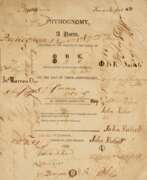

Joseph Bartlett was an American lawyer, politician, and poet.
Bartlett graduated from Harvard and began his law practice in Woburn. In 1782, he was elected a member of the Harvard chapter of the PBK. In 1803 he moved to Saco, Maine, where he was elected state senator the following year.
Joseph Bartlett was a man of eccentricity, with a very peculiar taste. His charisma and sharp wit ensured the success of his lectures. Bartlett is the author of the satirical poem Physiognomy, a Poem (1799).
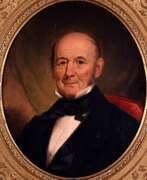

Abijah Bigelow is an American legislator, U.S. Representative from Massachusetts, poet and publicist.
Bigelow attended Dartmouth College in Hanover and became a lawyer. Between 1810 and 1815, he represented Massachusetts in the U.S. House of Representatives, where he strongly opposed the War of 1812. He also served as a justice of the peace from 1809 until his death.
As an author and poet, Bigelow published his work in Worcester newspapers throughout his life. Six essays entitled "Political Reflections" were published in the Massachusetts Spy in 1812, and a series of articles on slavery, signed by him as "The Unprofessional," were printed in the Worcester Palladium in 1838. Bigelow was also a member of the American Antiquarian Society.
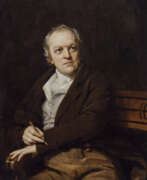

William Blake was an English poet, painter, and printmaker. Largely unrecognised during his life, Blake is now considered a seminal figure in the history of the poetry and visual art of the Romantic Age. What he called his "prophetic works" were said by 20th-century critic Northrop Frye to form "what is in proportion to its merits the least read body of poetry in the English language". His visual artistry led 21st-century critic Jonathan Jones to proclaim him "far and away the greatest artist Britain has ever produced". In 2002, Blake was placed at number 38 in the BBC's poll of the 100 Greatest Britons. While he lived in London his entire life, except for three years spent in Felpham, he produced a diverse and symbolically rich collection of works, which embraced the imagination as "the body of God" or "human existence itself".
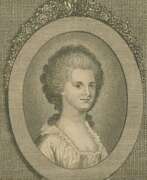

Ann Eliza Bleecker, née Schuyler, is an American poet and writer.
Ann from a young age surprised others with her poetic and literary talent. Married to lawyer John James Bleecker, she continued to write sentimental poems and so-called letters in which she enclosed her compositions. The family idyll was disrupted with the onset of the British offensive during the American Revolution. Ann and her husband had to flee, they experienced much grief and loss. All this greatly affected the character and creativity of Ann Bleecker.
In her most famous fiction narrative "The Story of Maria Kittle", which is addressed to her cousin, Ann describes the hardships of surviving captivity with the cruel Native Americans.
Ann Eliza Bleecker died at the age of 32, leaving behind manuscripts of poetry and prose that she never intended to publish. A few years later, her daughter, the poet Margaret Foger, published a significant portion of Bleeker's work, including twenty-three letters, thirty-six poems, and "The History of Maria Kittle," first in The New-York Magazine in 1790 and 1791, and then in a collection entitled "The Posthumous Works of Anne Eliza Bleecker" in 1793. "The History of Mary Kittle" was reprinted separately in 1797, a testament to the novel's popularity.
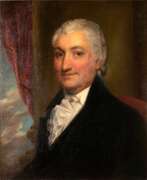

Hugh Henry Brackenridge was an American writer and poet, jurist and Pennsylvania Supreme Court Justice.
Hugh Henry graduated from the College of New Jersey (now Princeton University), learned Latin and Greek, and became a teacher. He later served in George Washington's army and published two verse dramas on revolutionary themes. He worked with the poet Philip Morin Freneau (1752-1832) on satirical and political publications.
Hugh Henry Breckenridge founded the Pittsburgh Academy, now the University of Pittsburgh, and the Pittsburgh Gazette, which is still published today.
Breckenridge is also known as the author of the first novel about frontier life in the United States after the Revolutionary War, Modern Chivalry. Considered one of the earliest American novels, this book was published in installments beginning in 1792 over a period of 23 years. In the latest edition, Captain John Farrago, along with his own Sancho Panza, Teague, leaves his farm in western Pennsylvania and sets out to find adventure in the big world.
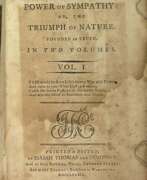

William Hill Brown was an 18th-century American novelist writer.
Brown apparently believed that one of the main purposes of literature was to instill some moral values. It is on this conviction that his novel The Power of Sympathy, or The Triumph of Truth-Based Nature (1789), which is considered the first American novel, is built. It caused a great scandal, however, because it is based on a real-life gruesome story of kidnapping, accidental incest, and suicide.
This novel is a prime example of the American approach to the European genre of the epistolary novel, but with lush descriptions of landscapes and a frank discussion of American slavery. This book can also be considered one of the first explicitly American works of literary criticism, containing lengthy reflections on the nature and purpose of literature and its role in moral formation, especially for women. The popularity of this work initiated the creation of many sentimental novels in the United States.
During his short life, Brown also wrote the romantic novel Harriot, or Domestic Reconciliation (1789), the play West Point Preserved (1797), a tragedy about the death of a Revolutionary spy, a series of verse fables, the West Indies-style comedy Penelope, and a second short novel about incest and seduction, Ira and Isabella.
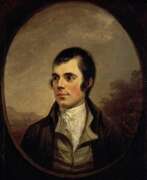

Robert Burns (Gaelic: Raibeart Burns or Rabbie Burns) was a Scottish poet, folklorist, and bard.
The hard farm life of his father significantly influenced Robert's outlook. Education of the novice poet received a sketchy, reread all English writers, knew Latin and French. In time, he became an opponent of the social order of his time and a satirist of all forms of religious and political thought that lead to inhumanity.
Burns' first book, entitled Poems, mostly in the Scottish dialect, was published in 1786. It was well received by the public, and the elated author traveled to Edinburgh, where he met James Johnson, a keen collector of Scottish songs. Together they produced a book, The Scottish Musical Museum. This and a similar book, George Thomson's Selected Collection of Original Scottish Songs for Voice (1793-1818), contain the bulk of Burns' songs.
Robert Burns was torn between his farming background and the much higher status of many of the intellectuals with whom he socialized and corresponded closely. Although he obtained a position in the excise office, this did little to satisfy the ambitions of the somewhat naive poet.
Having gained a reputation as a writer of poems and songs in Scottish and English, Burns went on to collect and adapt Scottish folk songs and created one of his major works, Tam of Shanter (1791), a narrative poem based on a folk legend. Even today Burns is honored as Scotland's national poet and is considered a pioneer of the Romantic movement in England.
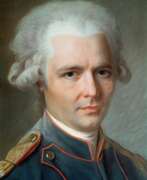

Pierre Choderlos de Laclos, full name Pierre Ambroise François Choderlos de Laclos, was a French politician, inventor, military leader, and writer.
De Laclos initially pursued a military career, but soon abandoned it, deciding that he would achieve greater fame by becoming a writer. He wrote poetry, erotic stories. His first novel "Dangerous Liaisons" (Les Liaisons dangereuses, 1782) immediately made a great impression and caused a mixed reaction in society. This is one of the masterpieces of novelistic literature of the XVIII century, which describes the love affairs of the aristocracy. On its motives, a large number of commentaries were later written, plays were staged and movies were filmed.
Later, Pierre Choderlot de Laclos worked for some time as secretary to the Duke of D'Orleans, writing several treatises on military and political topics. And in 1792 he again joined the army, where under Napoleon he rose to the rank of general, participated in the Rhine and Italian campaigns.
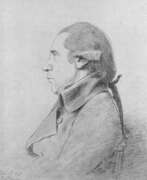

William Combe was a British writer and poet.
Combe authored a variety of prose and satirical verse, but is best known for the popular Dr. Syntax series of books published between 1812 and 1821, for which he wrote the text and artist Thomas Rowlandson did the drawings. The first book in the series, The Journey of Dr. Syntax: In Search of the Picturesque (1812), was published by the publisher Rudolf Ackerman, and he oversaw further collaboration between Combe and Rowlandson. William Combe's poems about Dr. Syntax with Rowlandson's illustrations were immensely popular in their day.
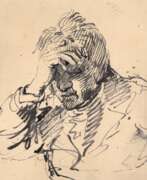

George Cumberland was an English art collector, writer and poet. He was a lifelong friend and supporter of William Blake, and like him was an experimental printmaker. He was also an amateur watercolourist, and one of the earliest members of the Bristol School of artists. He made use of his wide circle of connections to help its other members, in particular assisting and influencing Edward Bird and Francis Danby.
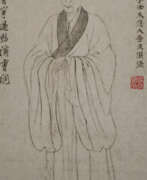

Zhū Dā (Chinese: 朱耷) was a Chinese painter, poet and calligrapher of the late Ming and early Qing dynasties. Known by the pseudonym Bada Shanzhen (Chinese: 八大山人), the man from Mount Bada.
Bada Shanren belonged to the imperial family of the Ming Dynasty, but chose to become a Buddhist monk and led a reclusive lifestyle. His artistic style was characterised by a unique combination of traditional Chinese ink painting techniques and bold, expressive brushstrokes. Bada Shanren's works often depicted landscapes, birds, flowers and animals, demonstrating an exceptional ability to convey the essence of the natural world. His paintings reflected a sense of spiritual introspection and a deep connection to nature. Despite the turbulent times in which he lived, Bada Shanren's artistic legacy remains highly regarded and his works are still considered masterpieces of Chinese ink painting.
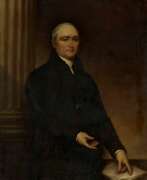

Timothy Dwight IV was an American clergyman, teacher, author, and satirical poet.
Dwight was the eldest son of farmer and merchant Timothy Dwight III. He graduated from Yale University, was a schoolmaster, a Massachusetts state legislator, and a chaplain in the Continental Army. In 1783 he opened a successful school in Greenfield Hill, Connecticut, where he became pastor of the Congregational Church.
In Connecticut, Dwight began writing poetry, such as Greenfield Hill (1794), and epics, including The Conquest of Canaan (1785), an allegory of the conquest of Connecticut from the British. His works are characterized by moralizing and moralizing. Dwight was also the author of political satire, as well as a verse satire on Voltaire, "The Triumph of Infidelity." He and his brother Theodore were members of a group of writers known as the Hartford Witters, centered around Yale University.
From 1795 to 1817. Dwight served as president of Yale University and was extremely influential in modernizing the curriculum. He was an active and eloquent professor of theology; his sermons were published in Theology; Explanation and Defense, 5 volumes (1818-19).
Dwight was also a member of the American Academy of Arts and Sciences and an early member of the American Antiquarian Society.
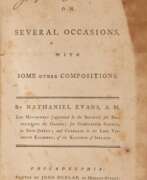

Nathaniel Evans was an American colonial clergyman and poet.
Evans was born in Philadelphia in the family of a merchant, graduated from the William Smith Academy in that city. In 1765 he received a master's degree from the University of Pennsylvania. In the same year he edited a collection of poems by his friend Thomas Godfrey. He also organized churches in Waterford and Gloucester, New Jersey.
Nathaniel Evans died of tuberculosis after living only 25 years, so his poetic talent remained undiscovered. But from a collection of a few of his poems published in 1772, we can tell that his mind was of a fine and refined stock, and his imagination was vivid.
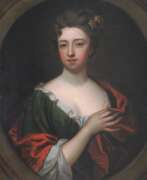

Elizabeth Graeme Fergusson or Betsy Graeme was an American colonial writer and poet.
Elizabeth Graeme was born and raised in a wealthy and influential Philadelphia family. In 1764-65, she traveled to London, where she met several leading literary and scientific figures. She soon established something of a literary salon at her native Graeme Park Manor.
Elizabeth Fergusson left few literary works other than a translation of The Adventures of Telemac from the French and a long poem on female suffering, The Abandoned Wife. She is remembered more for her letters and actions during the American War of Independence (1775-83), in which her family suffered considerably. Her husband Henry H. Fergusson was arrested and outlawed, and Graeme Park was confiscated at the end of the war.


Philip Morin Freneau was an American publicist, editor, and known as the "poet of the American Revolution".
After graduating from Princeton University, Freneau taught school and studied to become a minister. With the outbreak of the American Revolution, he began writing scathing satire on the British and the Tories. During a two-year voyage to the Caribbean islands, he created the poems "The Beauties of Santa Cruz" and "The House of Night," and in 1778 he became involved in the war. After his release from British captivity, Freneau wrote a book in verse, "The British Prison Ship" (1781).
After serving as a sea captain for several years, Freneau took up journalism. In his National Gazette newspaper in Philadelphia, he sharply criticized George Washington.
Freneau's poetry, which accompanied him throughout his life, covers a variety of subjects, including political situations, American Indians, nature, the sea, and naval battles. His political poems are often satirical, but his nature poems are very lyrical.
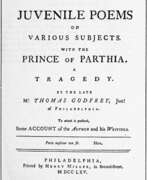

Thomas Godfrey, Jr. was an American poet and playwright.
Thomas Godfrey's father was the inventor of the quadrant and one of the first members of the American Philosophical Society, organized by Benjamin Franklin. Having been home educated and graduated from the Philadelphia Academy, the young Godfrey was first interested in painting, but soon switched to poetry.
Thomas Godfrey lived only 26 years, but left a bright mark in the history of the young country. He managed to write a play-tragedy about ancient times, "The Parthian Prince", which was published in the United States after his death, in 1765. It was staged by an American troupe in Philadelphia on April 24, 1767. This play was significant in that it was the first play written by a native-born American and staged by professionals.
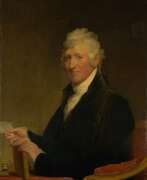

David Humphreys was an American soldier, statesman, diplomat, writer, poet, and biographer.
He received his bachelor's degree from Yale University, where he became a member of the Hartford Witters and taught, and went to serve in the Continental Army in the summer of 1776.
A close friend and aide to George Washington, Humphreys was an eyewitness and active participant in the early years of the United States. During his long career, Col. David Humphreys served as a soldier, secretary, diplomat, and was a writer, poet, orator, biographer, and industrialist. His speeches, poems, literary works, and correspondence with Washington and others of the founding generation serve as a valuable source for historians of the early republic in the late eighteenth and early nineteenth centuries.
Because of his intelligence and diligence, David Humphreys had a long record of service and held many public offices, among others serving as U.S. minister to Spain from 1797 to 1801. He was a member of the Royal Society of London and the American Antiquarian Society.
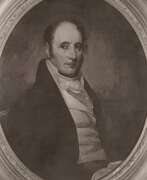

William Irving was the older brother of the famous writer Washington Irving and a U.S. Congressman.
William Irving was engaged in fur trading and other businesses, and wrote several essays and poems for the satirical magazine Salmagundi, which was published by Washington Irving as a periodical and later published as a book.
In 1813. William Irving was elected by Democratic-Republicans to represent New York's 2nd Congress in the U.S. House of Representatives.
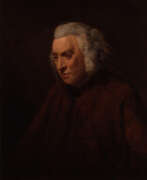

Samuel Johnson was an English writer who made lasting contributions as a poet, playwright, essayist, moralist, critic, biographer, editor and lexicographer. He was a devout Anglican, and a committed Tory. The Oxford Dictionary of National Biography calls him «arguably the most distinguished man of letters in English history». James Boswell's Life of Samuel Johnson was selected by Johnson biographer Walter Jackson Bate as «the most famous single work of biographical art in the whole of literature».
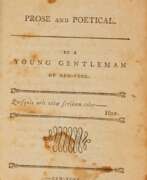

John Blair Linn is an American priest and poet.
Linn graduated from Columbia College and later became a priest. While in college, he published in magazines and newspapers, later writing a play and several collections of poetry and prose.
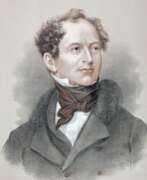

Thomas Moore was a British poet, songwriter and composer, a representative of Irish Romanticism.
Thomas graduated from Dublin University, from the age of 14 he collaborated with various Dublin journals. In 1800 he published his "Odes of Anacreon", and a year later - a collection of Poems by the late Thomas Little ("Poems by the late Thomas Little") and became widely known. Visiting the United States, Moore published a collection of poems, where he spoke about this country very sharply.
In 1812, Thomas Moore met Byron, became his close friend and wrote one of the best biographies of him, published in 1835. Moore's most famous works are "The Last Rose of Summer" and the collection "Irish Melodies" (1807-1834), which brought him a stable income for many years. In Russia, however, he is known primarily for the poem Those evening bells from the collection published in 1818. The poem was translated by Ivan Kozlov, and it turned into the famous and beloved song "Evening Bells".
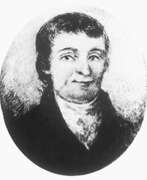

William Munford was an American legislator and court reporter, writer, poet, and translator.
After receiving a law degree, Munford entered politics, represented Mecklenburg County in the Virginia House of Delegates, and was elected to the state Senate. Munford was also a legal reporter for decisions of the Virginia Supreme Court of Appeals, for which he prepared six annual issues a year.
He also published collections of poetry and engaged in translations of classical works, including Homer's Iliad.
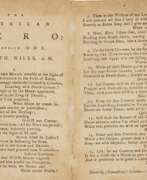

Nathaniel Niles is an American lawyer and politician, a member of the House of Representatives from Vermont.
Niles attended Harvard College and the College of New Jersey, eventually becoming a preacher but also active in politics. Niles sat in the lower house of the Vermont legislature for eight terms. From 1784 to 1787 he was a member of the state supreme court.
In addition to his sermons, he published numerous theological articles. When the American Revolution broke out in 1775, Niles enthusiastically supported the war against England. He even wrote his only work of poetry, an ode entitled "American Hero," to commemorate the Battle of Bunker Hill, which was set to music and became quite popular among New England soldiers and militia.
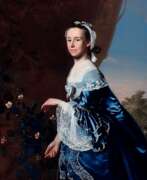

Mercy Otis Warren was an American poet, satirist, playwright, historian, and essayist of the American Revolution.
Mercy Otis was born into a prosperous Cape Cod Island family and was immersed early in the tumultuous political events taking place in the country at the time. One of her brothers was political activist James Otis, who was involved in the American Revolution from the beginning. In 1754, Mercy Otis married farmer James Warren, who later served in the Massachusetts legislature (1766-78). Through her husband's political connections, Warren was personally acquainted with most of the leaders of the Revolution and was constantly at the center of events for more than two decades.
Combining her own convictions with her writing talent, Warren became a poet and historian of the revolutionary era. Her first incisive and polemical pieces in verse were published in a Boston newspaper. This was followed by the prophetic novel Defeat and other works. In 1790 she published a collection of her works, Poems, Dramatic and Miscellaneous, which included two new plays, The Sack of Rome and The Ladies of Castille. For a woman of the time, such publications were very daring, as female writers usually hid under pseudonyms.
Warren also corresponded extensively with politicians, including George Washington and Thomas Jefferson. In 1805, she completed a three-volume work entitled A History of the Rise, Progress, and Termination of the American Revolution. This book was the earliest work on historical events in the country. Its proximity to political leaders and major national events makes Mercy Warren's writings on the American Revolutionary period especially valuable.
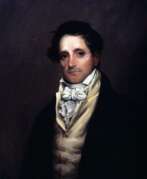

James Kirke Paulding was an American novelist, playwright, and statesman.
At the age of 18 in New York, he became friends with his brothers William and Washington Irving, and together with them began to write in the periodical satirical publication created by them "Salmagundi"). Paulding wrote several novels and plays, as well as many poems.




Susanna Rowson, née Haswell, was an American writer and poet, playwright, actress, and educator.
Susanna Haswell was the daughter of an officer in the Royal Navy. She published her first novel, Victoria, in 1786 and soon married businessman William Rowson. Susanna's greatest success was her first American bestseller, the novel Charlotte, A Tale of Truth (1791, in later editions under the title Charlotte Temple). This novel, a conventional sentimental story of seduction and remorse, was immensely popular and went through more than 200 editions.
In 1792 she became an actress and performed with her bankrupt husband in Scotland, as well as in Philadelphia, Baltimore, and Boston. In 1797, after retiring from the stage, Susanna opened the first "female academy" in Boston. Susanna Rowson also wrote many plays and musicals, and in doing so, helped to develop the performing arts in the United States. Later, she also edited the Boston Weekly Magazine, wrote geography and spelling textbooks, and moralizing manuals.
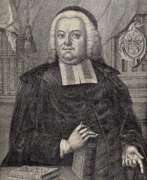

Heinrich Jacob Sivers was a German Evangelical Lutheran theologian and scholar, poet and writer, naturalist and collector.
Sifers studied law and theology at the University of Kiel, and received his doctorate at the University of Rostock, where he lectured and wrote various works. He wrote many poems, sermons and ceremonial speeches in German, Swedish and Latin.
Heinrich Sivers also studied geology, traveled extensively in Scandinavia, and compiled his own mineral collection. In 1737 he sold many of his minerals, as well as a cabinet of Roman coins to Count Carl Gillenborg, today they can be seen at Lund University.
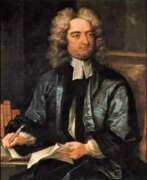

Jonathan Swift was a British-Irish writer, essayist, philosopher, and author of the world-famous satirical novel Gulliver's Travels.
Swift also wrote numerous works, including The Tale of the Barrel (1704), An Argument Against the Abolition of Christianity (1712), and A Modest Proposal (1729). Almost all of Swift's satirical works were published anonymously, giving the author wide latitude in expressing his talent as a satirist.
Swift was a clergyman, made a career in London, became the chief pamphleteer and political writer of the Tories and headed the Tory journal "The Inspector", and then returned to Ireland, where he created his major life's work.
The four-part novel Gulliver's Travels, Jonathan Swift's greatest satire, was first published in 1726 and has since been reprinted hundreds of times in many languages around the world. The author describes in an engaging style the different races and societies that Gulliver encounters on his travels to ridicule the many errors, follies, weaknesses and vices to which people and society at large are subject. The author's boundless imagination, bitter irony, keen intellect and brilliant language give this work a world-class scope.
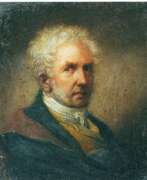

Salvatore Tonci was an Italian painter, musician, singer, and poet, renowned for his multifaceted artistic talents and his life largely spent in Russia. Born in January 1756 in Rome, Tonci moved to Russia in 1797, where he significantly contributed to the cultural scenes of St. Petersburg and Moscow until his death in December 1844. He was instrumental in the founding of the Architectural School in Moscow and is celebrated for his portrait paintings, which capture prominent figures of his time in a style that combines Italian finesse with Russian sensibilities.
Throughout his career, Tonci produced a series of notable works, including portraits of Russian Emperor Paul I and the poet Gavrila Derzhavin. His work is characterized by its historical depth and artistic mastery, reflecting the social and political landscapes of 18th and 19th century Russia. His contributions were not limited to painting; he also engaged in poetry and played a vital role in the artistic community as an educator, supervising drawing classes at the Moscow School of Painting, Sculpture and Architecture for over two decades.
For those interested in exploring the works of Salvatore Tonci or learning more about his contributions to art and culture, his paintings and other artistic expressions provide a fascinating glimpse into the rich cultural interchange between Italy and Russia during his lifetime. To stay updated on new discoveries and auction events related to Salvatore Tonci, you can sign up for updates, ensuring you don't miss out on any valuable insights or opportunities related to this remarkable artist.
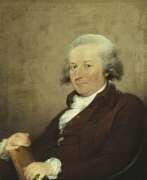

John Trumbull is an American writer poet-satirist.
He studied law at Yale University, worked as a tutor and wrote poetry and essays, and was a leader of the satirical group The Hartford Witters. In his satirical poems Trumbull ridiculed, among other things, the educational system of his day, and he gained fame for his satirical epic poem on the American Revolution, M'Fingal (1775-82), which focused on the ineptitude of the British during the War of Independence.
John Trumbull later served as state's attorney in 1789 and then as a state legislator and judge until 1819. In 1791, he was elected a member of the American Academy of Arts and Sciences.
John Trumbull is a third cousin of the painter John Trumbull (1756-1843).
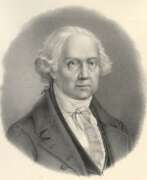

Johann Martin Usteri was a Swiss poet, noted for his narrative poetry and his idylls. He was one of the earliest poets to write poems in Swiss German, specifically in his native Zürich dialect; among these, his Vicar holds the foremost place.
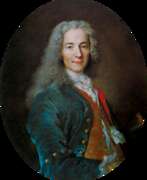

Voltaire, born François Marie Arouet, was a French philosopher-enlightener of the French Enlightenment, poet and writer, satirist, tragedian, historian and essayist.
Voltaire's long life fell on the last years of classicism and the eve of the revolutionary era, and in this transitional period his works and activities had a significant impact on the direction of European civilization. Through his critical freethinking and wit, Voltaire won the minds of many 18th century European rulers. To this day, he continues to enjoy worldwide fame as a courageous fighter against tyranny, bigotry, and cruelty.
Voltaire was an advocate of freedom of speech, freedom of religion and separation of church and state. He was a versatile and prolific writer in all literary forms, including plays, poems, novels, essays, histories, and scholarly expositions. In total, he wrote more than 20,000 letters and 2,000 books and pamphlets. Voltaire's most famous works are the tragic play Zaire, the historical study The Age of Louis XIV, and the satirical novella Candide.
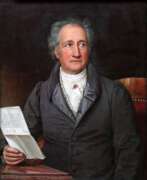

Johann Wolfgang von Goethe, a German polymath and writer, is celebrated as one of the most influential figures in the German language and Western culture. His vast array of works spans poetry, novels, plays, and scientific writings, reflecting his diverse interests and profound impact on various fields.
Goethe's early life in Frankfurt laid the foundation for his diverse interests. After studying law, he gained fame with "The Sorrows of Young Werther," which led to an invitation to the Weimar court. His contributions there were significant, including roles in the ducal council, mining supervision, and cultural endeavors like theater management and the botanical park's planning.
His literary achievements are vast, with notable works like "Faust" and "Wilhelm Meister's Apprenticeship," which delve into human nature and societal reflections. Goethe's "Sturm und Drang" period was marked by intense emotion and a break from traditional forms, influencing subsequent cultural movements.
Johann Wolfgang von Goethe's interest in science is equally noteworthy. He made contributions to biology, zoology, and color theory, advocating for a holistic view of nature and expressing skepticism toward restrictive scientific methodologies. His works in these areas reflect a deep desire to understand and articulate the natural world's interconnectedness.
For art collectors and experts, Goethe's influence extends beyond his literary and scientific contributions. His role in Weimar Classicism and his artistic endeavors offer rich insights into the period's cultural landscape, providing a multifaceted perspective on his legacy.
To stay informed about developments and events related to Johann Wolfgang von Goethe, consider signing up for updates. This subscription will keep you informed about new product sales and auction events related to Goethe's works and influence, offering exclusive insights for enthusiasts and collectors.
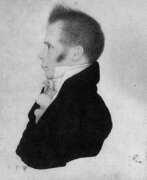

George Watterston is an American politician, author and journalist.
He graduated from the Charlotte Hall Military Academy with a law degree. But, apparently, he soon became so disappointed in the profession that he began to write poetry and prose, in which he portrayed lawyers in a very unsightly form. His first novel "The Lawyer, or The Man as he ought not to be" Watterston published in 1808. This poignant novel is ostensibly a confession of a corrupt lawyer and seducer in the spirit of Stephen Burroughs' Memoirs of Stephen Burroughs. Watterston's ironic take on the didactic novel straddles the line between Charles Brockden Brown's gothic thrillers and dark comedy. He also wrote the novel Glencarne or the Disappointments of Youth (1810), the play Child of Sentiment (1809), and the poem Scenes of Youth (1813), among others.
After the end of the War of 1812, President James Madison appointed Watterston as Librarian of Congress, the third person to hold the position and the first to be solely responsible for it. He held the position from 1815 to 1829.
In 1813, Watterston became editor of the Washington City Gazette. And after his dismissal from Congress, he became editor of the National Journal. He continued a productive literary and journalistic career until his death.
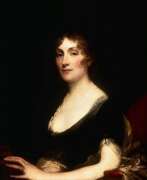

Sarah Wentworth Apthorp Morton was an American poet of the American Revolutionary period.
Sarah received a good education and early began writing poetry, the first of which was published under the pseudonyms Constance or Philenia. Frequent publications in periodicals made Filenia a prominent American poetess of her period, critics even in Europe paid attention to her.
Sarah Morton was called "American Sappho" by her contemporaries and was considered one of the finest women poets of the 18th century. She wrote long, sentimental, narrative poems that discuss the composition of the new nation, interracial relations, and heroism, both male and female. She also wrote about the virtues of freedom.
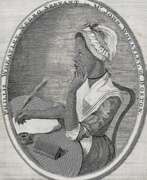

Phillis Wheatley or Phillis Wheatley Peters was an American poet born in Africa.
A native of West Africa, Phillis Wheatley was kidnapped as a young child and sold as a slave in 1761 to John and Susanna Wheatley in Boston. They chose the name Phyllis for her in honor of the ship on which the girl traveled the Middle Passage. The Wheatley family quickly recognized her intellectual abilities and encouraged her study of the classics. Phyllis began writing poems and verses, and some were even published when she was only 14 years old.
However, the 18th-century public had great difficulty accepting a black slave girl as a writer. In May 1773, Wheatley traveled to London with her master's son. There her first book, Poems on Miscellaneous Subjects, Religious and Moral, was published. Wheatley's literary talent and personal qualities contributed to her great social success in London. In the fall of 1773, Phyllis returned to the United States and Wheatley was granted her freedom. She married, but lived only 31 years.
Wheatley's most famous poem today, "On Being Brought from Africa to America" (1768), directly addresses the theme of slavery.
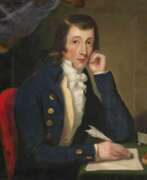

Alexander Wilson was a Scottish-born American naturalist, ornithologist, illustrator, and poet.
Wilson emigrated from Scotland to America in 1794, spent several years teaching in Philadelphia and New Jersey, and then became interested in studying native birds. He traveled extensively in the American wilderness and captured and studied over 300 different birds, including several previously unknown. He made his own drawings and detailed descriptions, supported by reading scientific literature.
The results of his research were published under the title American Ornithology in eight volumes beginning in 1808. The ninth volume was published after his death in August 1813. One of the first subscribers was President Thomas Jefferson. Alexander Wilson was a member of the Society of Artists of the United States and the American Philosophical Society. The Wilson Ornithological Society is named in his honor, and a monument is erected in Abbey Close, Paisley. Several species of birds are named in his honor.
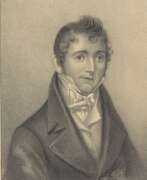

Samuel Woodworth was an American writer and poet, playwright and journalist.
After completing his apprenticeship as a printer, Woodworth traveled to New Haven, Connecticut, and worked for the Connecticut Herald newspaper. During the War of 1812, he edited a weekly newspaper called The War and others. He also wrote several successful operettas.
Samuel Woodworth was a popular poet in the 19th century and is remembered today as the author of the sentimental poem "The Old Oak Bucket".
